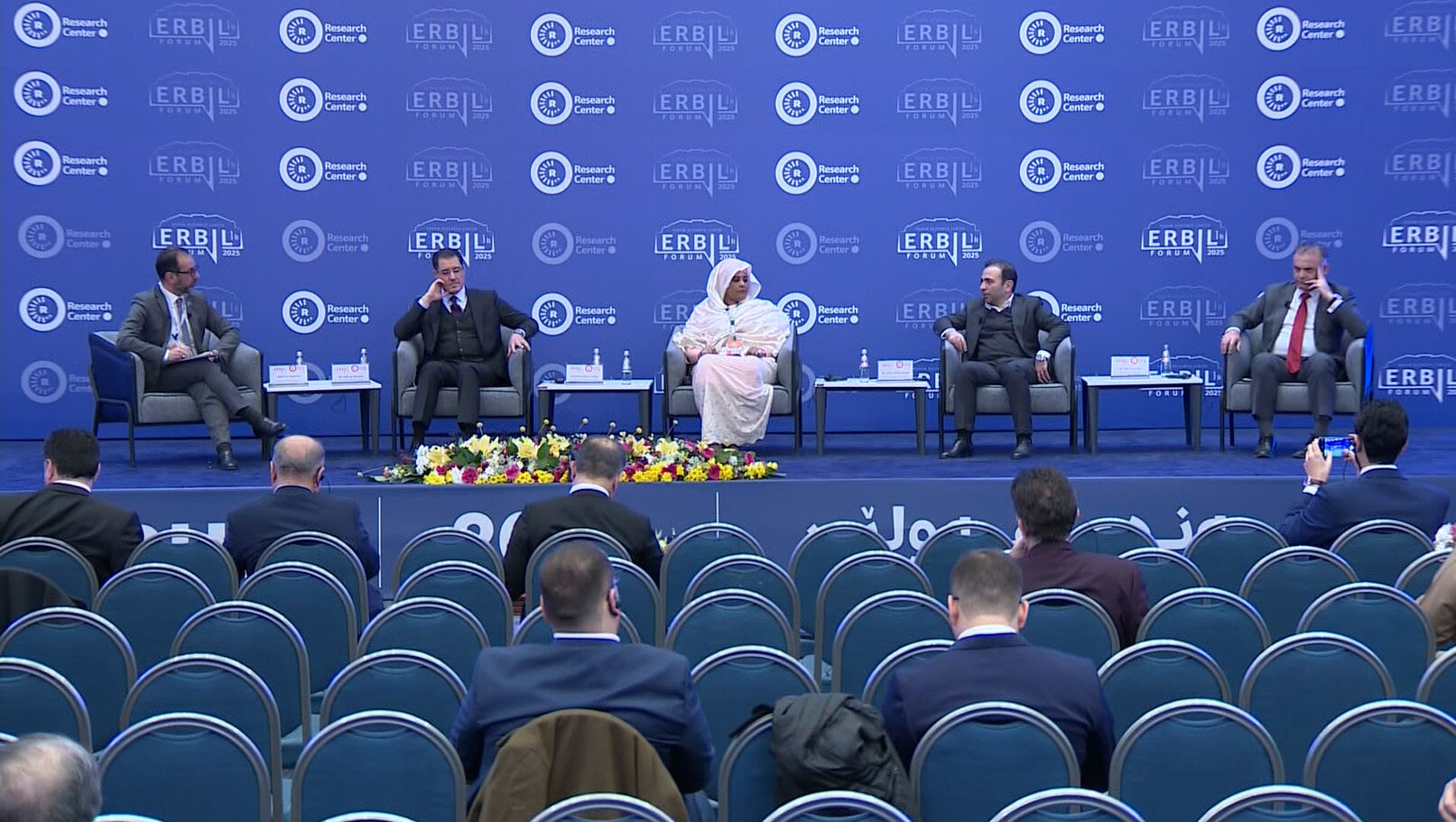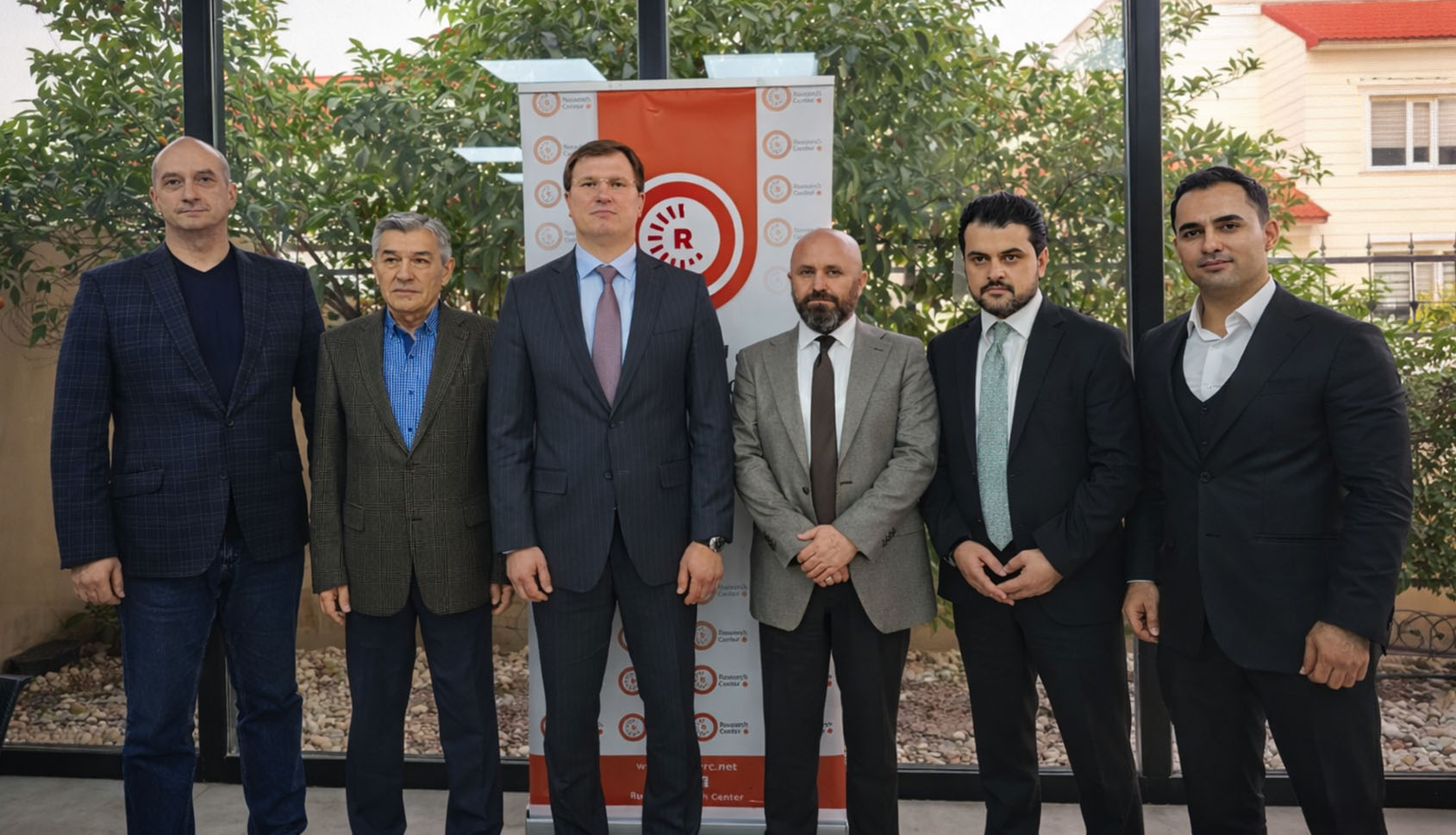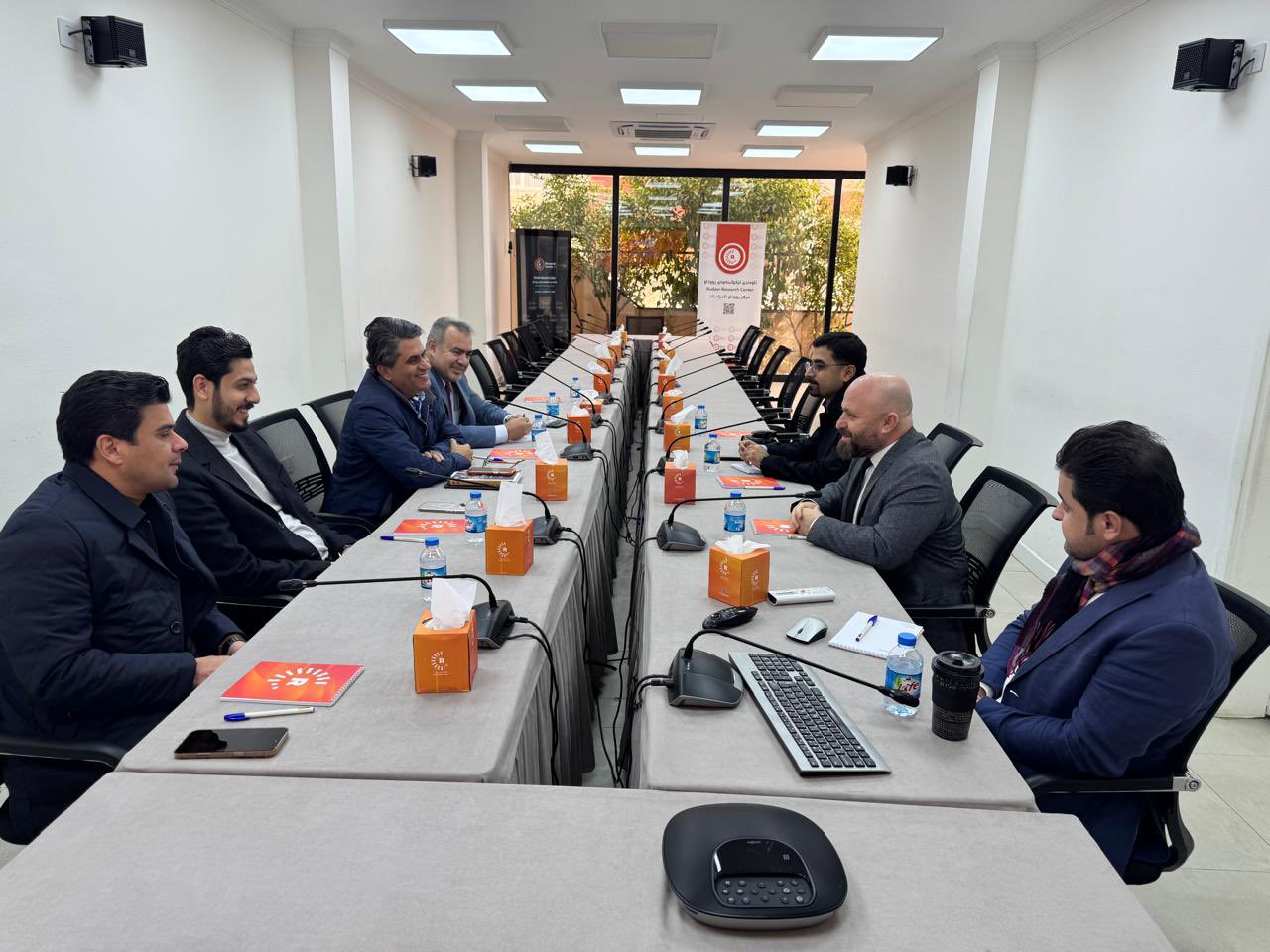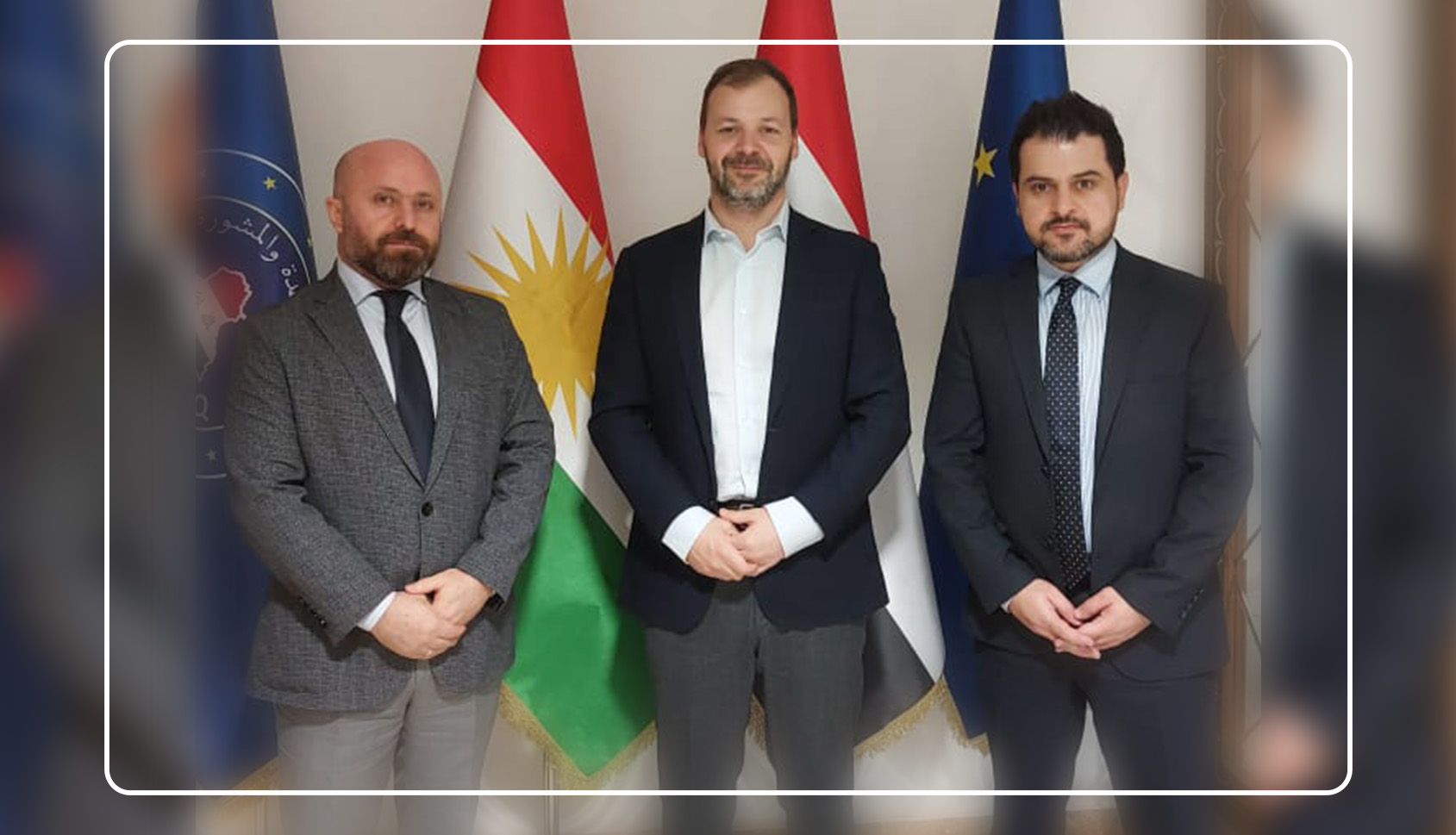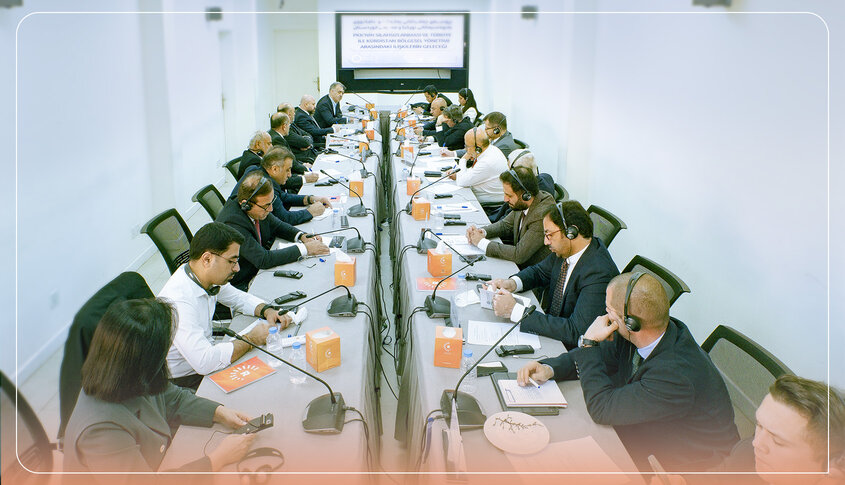Panel 05: Visions of a Transitional Period in the Middle East – States' Perspectives on Political, Economic, and Social Turning Points
09-04-2025
Abbas Al-Anbouri: In the name of God, the Most Gracious, the Most Merciful. Good evening. We apologize for the delay in starting this panel. We will aim to keep our discussion short and concise while preserving the core content of the topic and addressing the questions posed to our esteemed guests.
Today, we will discuss the Middle East with our distinguished guests. The region has changed dramatically since October 7. The events in Gaza and their aftermath, including the Israeli attack on Lebanon and the martyrdom of Sayyid Hassan Nasrallah, have had a significant impact on the region, particularly on Iraq.
Today, we aim to discuss the nature of stability in the Middle East, with a focus on Iraq. Iraq stands as the only relatively stable country in the Middle East among those surrounding Gaza. The Iraqi government has made efforts to avoid participating in the post-Gaza conflict. Although some political parties have tried to involve Iraq in the war, these efforts have not gained support from the government, due to an assessment of the internal security situation and the potential impact of the war on Iraq's stability. Nevertheless, there is an ongoing debate within Iraq about whether its security and stability are under threat.
Abbas Al-Anbouri: Mr. Minister, Dr. Nuri al-Dulaimi, on the economic front, there has been widespread concern that Iraq may face significant economic challenges in the coming years. There is talk of a budget shortfall and falling oil prices, which pose a threat to Iraq's overall stability. What is your opinion on this matter?
Nuri al-Dulaimi:
Thank you very much for the warm hospitality. First, as you mentioned, I will summarize my speech to ensure we have enough time for the discussion. What happened on and after October 7 was an earthquake, one that redrew not only geographical boundaries but also political maps. I don’t mean this just in a geographic sense; it extends to the political maps as well. This earthquake, and the subsequent redrawing of maps, will impact the economic, social, and security aspects as well.
Today, we are witnessing a complete shift in political alliances, with former rivals becoming allies and vice versa. Politically, this is evident, but economically, Iraq, a country heavily dependent on oil, is facing a massive problem and a fragile economy. If we are to describe what happened after October 7, we must certainly say it was an earthquake.
When a storm strikes, people must first focus on closing the gaps and cracks that could harm their homes. In general, the Iraqi people have rallied around the government to overcome these threats, striving to avoid becoming a polarizing conflict zone. Instead, Iraq aims to serve as a bridge and mediator, working to create stability and peace.
Abbas Al-Anbouri:
Mr. Minister, do you believe there have been sufficient preparations made? Has the current government prepared for a potential decline in oil prices, for example? Have any economic measures been taken, or is the government still operating reactively on a daily basis, according to current circumstances?
Nuri al-Dulaimi:
There is no clear support for the government in addressing the challenges it faces. When a crisis occurs, everyone tends to distance themselves quickly, but the government has continued with its efforts. These efforts may not be perfect, but they are, for now, acceptable given the major obstacles.
There is significant focus on increasing non-oil revenues, and progress has been modest. Iraq is an agricultural country, and there is a real opportunity to capitalize on that. The Development Road project can serve as a valuable resource to strengthen state finances. Additionally, investing in renewable energy should be seen as both an opportunity and an avenue for growth.
If we all unite behind the government, putting aside minor political conflicts, we can collectively overcome this crisis with minimal damage.
Abbas Al-Anbouri:
Sudan is never far from the hearts of Iraqis. As you know, Madam Minister, Sudan is a beloved country for Iraqis, a nation that has always influenced the course of events in the Middle East. In fact, there seems to be a lack of awareness regarding what is happening in Sudan. Do you think the current events and unrest in Sudan reflect the broader dynamics in the Middle East, or is what is happening in Sudan itself influencing those dynamics?
Additionally, there has been considerable talk about Sudan moving toward normalizing relations with Israel. Madam Minister, could you please provide us with an overview of the situation in Sudan and discuss its impact on, and relevance to, the broader Middle East?
Mariam Sadiq al-Mahdi:
Thank you very much, Mr. Abbas. In the name of God, the Most Gracious, the Most Merciful.
Welcome, everyone, and my sincere thanks to Rudaw Research Center and Riwaq Baghdad Center for organizing this panel and for inviting us. I am very happy to see my brothers and sisters here again in Erbil, the land of peace and diversity. I apologize to all of you that, after such a long time, we must speak to you with a dry political discourse, but God willing, the issue of Sudan will be an important one.
If we approach this from a perspective of lessons learned, as you mentioned and as the minister noted, Iraq has an experience that deserves attention. Likewise, there are experiences in Sudan worth considering for the lessons they offer and for prevention purposes.
Of course, as you mentioned, the situation in Sudan is both influential and influenced by the dynamics of the Middle East. Geographically, Sudan sits at the intersection of many key regions, and it has grown increasingly significant.
When we talk about renewable resources, such as water, wind, and solar power, Sudan leads the way. This is despite its vast, fertile lands that are suitable for farming with minimal effort. Additionally, speaking of resources like gold, Sudan is currently the third-largest gold producer in Africa, with an annual production of tens of tons. It is also the third-largest oil producer in Africa. Furthermore, when we talk about what are now called semi-precious stones, which the Fourth Industrial Revolution relies on for microchips, Sudan is rich in these minerals as well. It is also home to significant environmental diversity within Africa.
Due to these resources and its strategic geographic location, Sudan is now in the midst of an international conflict, which has shifted from being ideological to a contest over resources, international companies, intelligence, and trade.
Regarding Sudan's relations with Israel, this remains largely disconnected from the Sudanese people, who continue to hold a deep commitment to the Palestinian cause. There is no doubt about this, and it is an important point. The struggle to normalize relations with Israel has been marked by tensions between the civilian and military factions, especially in light of the coups against civilian rule. As a result, Sudan is deeply involved in the changes occurring around the Red Sea, and it is inseparable from all the shifts taking place.
Iraq's experience, especially what is happening in Erbil and the efforts to establish a true federal system, has a significant impact on Sudan. We all see this as one of our potential solutions. At the same time, however, despite our close relationship, we are now confronted with a serious threat from a major global power: the United States of America. The current U.S. president, with his irresponsible actions regarding the Gaza conflict, has put regional and global peace at risk. Furthermore, the recent dangerous shift made by him, dividing us all and undermining democratic principles in an unprecedented way, has had serious repercussions, as we saw with his actions against the U.S. armed forces in the past.
Abbas al-Anbouri: Thank you very much, Mrs. Minister, for informing us about the internal events in Sudan, which are of great importance to the international community. You also highlighted critical points, one of which was echoed by Mr. Nuri al-Dulaimi: the economic dimension, its importance for Sudan, and the profound impact it has. You mentioned that the ideological conflict is no longer the same as it once was, but rather, it has evolved into a struggle over Sudanese resources, opportunities, and wealth.
Let me turn to Mr. Khalil. Iran now champions a crucial ideology in the Middle East, the concept of the "defensive front." Iran currently leads this front, which has faced significant defeats in the past—such as what happened in Gaza and Lebanon. Iran is also grappling with domestic economic challenges, and as is evident from this panel, the economic dimension plays a central role.
How would you explain the nature of the current situation and its economic impact within Iran? What is the role of the Islamic Republic of Iran in shaping these events, and what preparations are being made?
Khalil Shirgholami:
Iran has been battling efforts by Israelis to create a manipulated narrative, one that attempts to establish a dichotomy between Iran and Israel. This narrative suggests that the ongoing conflict between them is merely a rivalry based on the logic of balance of power or power politics, while deliberately ignoring the real root cause of the problem: the issue of Palestine.
The true narrative is grounded in the fact that Israel has been an occupier for over 75 years, subjugating the Palestinian people. This is the fundamental issue. However, Israel has been trying to manipulate this original narrative, creating a false one, framing the conflict between Iran and Israel as a rivalry based solely on power politics. This is a crucial point that needs to be addressed.
Another important factor is that, as everything in the region is currently in transition, the Middle East has become a test laboratory for the changing global order. The regional order in the Middle East will play a significant role in shaping the new global order. The current order, which favors the United States and Israel, is an Israeli-led order in the region. Netanyahu himself mentioned this agenda when, about six months ago, he referred to the most brutal killing of the century as part of the new order they are attempting to create in the Middle East.
This order is supported by the United States, aiming to establish Israeli hegemony in the region. According to this strategic vision, every other country in the region should be neutralized. This explains the bombing of infrastructure in Syria, where Israel has been working to "West Bankize" the entire region—Syria, Gaza, Lebanon—and, if possible, extend this control to other countries in the region. The goal is to eliminate any potential rival to Israel. This is what they refer to as the "Israeli order" or the "new order" they are striving for.
However, it is important to understand that, while Israel tries to manipulate the narrative, the real cause of resistance in the region is deeply rooted in the heart of the Middle East and the people living there. As long as the occupation persists, resistance will continue.
I am not concerned with the many narratives or the rhetoric surrounding the so-called "axis of resistance," or the propaganda against it. The truth is that resistance will endure as long as the occupation continues in the region. Iran has been defending the very logic of resistance itself—not based on the balance of power or power politics, as Israel tries to frame it for their own interests, but because it is a moral and logical inclination to defend those who are oppressed. Iran’s support for this resistance has come at a high cost.
The economic sanctions—both primary and secondary—imposed by the United States have targeted not only Iran but also those countries working with it economically. These sanctions have had significant negative implications on the country’s economy. Despite these challenges, Iran continues to operate and function, and the reality of the situation must be recognized.
Abbas Al-Anbouri:
The minister said that the conflict is not an ideological conflict but rather an economic, financial, and power struggle. Khalil analyzed the nature of the defense front as an ideological theme, describing it as a natural method for humans. As long as there is occupation, there will be resistance.
I want to turn to you, Dr. Adel, with a direct question about the social dimension: Do you think there is a new map in the region? Specifically, in its ethnic, religious, and social divisions, is there a new power structure emerging in the region? Overall, do you think there are new social and power dynamics at play?
Dr. Adel Bakawan:
Thank you, Dr., and thank you to the friends at Rudaw, as well as to all those who worked hard to organize this forum. If no one understands how difficult it is to organize such a forum and the stress involved, I certainly do, as I have organized such forums myself.
But before I speak, I would like to make one note. What I am saying now is not a position on any particular country but rather an attempt to present objective knowledge in a concise way about the areas I will discuss. I ask our Iranian brothers, Persian brothers, Arab brothers, Turks, Kurds (although I am speaking in Kurdish), and Israelis not to take this as a position, as it is not. It is simply a quick interpretation of the situation following October 7th. I want to make this clear so that no one puts me in a difficult position by assuming I have taken a side.
Another important point I want to highlight is that the Middle East after October 7th is no longer the Middle East we knew before October 7th. After October 7th, we have five regions: an Arab region, a Turkish region, a Persian region, an Israeli region, and a Kurdish region—each of these regions is rebuilding itself.
Let me proceed quickly. On the Arab front, everything is being rebuilt around Saudi Arabia and Mohammed bin Salman. No state in the Arab world, from Egypt to Syria, can be rebuilt without the influence of Mohammed bin Salman. In a nutshell, if we had Egypt and Gamal Abdel Nasser in the 1960s, then after October 7th, we have Saudi Arabia replacing Egypt, and Mohammed bin Salman replacing Gamal Abdel Nasser.
Under his shadow, Egypt is moving forward, as is the UAE. This is the model that Mohammed bin Salman has been offering to the Arab world since October 7th—rebuilding the state on these three principles:
The principles of security, stability, and economic growth without democracy or human rights are central to this discussion. In this context, consider Egypt, which remains underdeveloped; the UAE, which is still undeveloped; Jordan, which faces similar challenges; and Syria under Ahmad Sharia, which seems to be heading in the same direction. This approach has been accepted by the Americans and Europeans because, at least, it offers a guarantee of stability.
Additionally, several states in the Arab region are in a process of disintegration. I regret to say this to our Iraqi brothers, but Iraq is on the verge of collapse unless it creates a new social contract that brings together Sunnis, Shiites, Kurds, and other minorities. This is similar to Lebanon, which is on the brink of collapse, as well as Libya, Sudan, Yemen, and other states. If Syria does not act, it will also fall into the category of collapsing states.
In the case of Israel, the events of October 7 shattered its symbolism and its mythology. After October 7, the rebuilding of Israel’s shattered sanctuaries was not anticipated by the Israeli public, nor by American and European diplomats. It wasn’t expected that Israel would take any actions within a year that would significantly impact the region or make it one of the most powerful forces in the Middle East. Therefore, if we talk about the first winner of last year’s events after October 7—marking a turning point in the Middle East—there is no doubt that Israel is the first winner.
Within Israel, the radical right has emerged as the first winner, while the left has been pushed aside. Seventy-nine percent of Israelis no longer believe that a Palestinian state is the solution to Israel's security and stability issues in the Middle East. This is a major turning point for Israeli society.
I will now quickly move on to the situation in Turkey, as we have limited time, and I know you're all fatigued. Excluding Israel from the equation, Turkey is the second significant winner after Israel. Turkey stands to gain the most from the changes happening at various levels.
Turkey has an ideological project: Islamic Turkey. This vision, which Turkey could have presented to Arab countries during the Arab Spring, failed. However, after the defeat of Bashar al-Assad and the end of his regime, there is now a significant opportunity for Turkey to advance its ideology and spread it to the Sunni areas of the Middle East in a peaceful and non-violent manner.
On the security front, there is also a major opportunity for Turkey to reassert itself as a key security player in the Middle East. We all know that Syria, under the leadership of Ahmed Shara, seeks to entrust the rebuilding of not only its army but also its intelligence, security, and police forces to Turkey. Turkey is expected to play a pivotal role in helping to establish these institutions.
Additionally, Syria shares a border with Turkey, which serves as both an ideological and a geopolitical frontier. Turkey can easily extend its influence into Lebanon via Syria and, from there, into the broader Middle East. Economically, Turkey stands to benefit significantly, as a recent report from France estimates that Syria will need $500 billion in reconstruction funding. This presents a huge market for Turkey to reboot its economy by engaging with Syria.
Now, let's consider two more areas before I conclude. The first is the Iranian sphere. Prior to October 7, I had prepared a book for publication in French titled The Dissolution of the Middle East. However, after the events of October 7, the publisher contacted me a week later, saying the book would need to be rewritten. This was because, before October 7, the Middle Eastern order was largely shaped by two actors: the Islamic Republic of Iran and Saudi Arabia, with Turkey and Israel outside the equation. Even the Abraham Accords had little impact on the Middle East prior to October 7.
However, after October 7, the situation changed dramatically. Iran not only lost influence over Syria, Lebanon, and the Palestinians to groups like Hamas and jihadist factions, but its hegemony in Iraq, the heart of Iranian geopolitics in the region, is also waning. This decline is so significant that the Islamic Republic of Iran’s main focus since October 7 is no longer how to control Baghdad or the four capitals of the Middle East (Baghdad, Beirut, Damascus, and Sana’a). Instead, the priorities of Iran are now threefold: First, how can I save the Islamic Republic of Iran from collapse? Second, how do I protect Iran’s nuclear weapons infrastructure from total destruction? And third, how can I revive Iran’s struggling economy? These are the core priorities now, and in this context, Iran’s influence in the Middle East has all but vanished.
The Kurdish region, located between Turkey, Syria, Iran, and Iraq, faces two very significant phenomena. The first is the peace process between Abdullah Öcalan and Recep Tayyip Erdoğan. If this peace process succeeds, I assure you that the Middle East will undergo a major transformation. For the past forty years, the PKK has posed an enormous security, military, and economic challenge for the Republic of Turkey. If this process is successful, over the next forty years, the PKK could become a strategic ally of Turkey, helping it expand its influence across the Middle East.
The second phenomenon is the weakening of the Resistance Axis. With all its factions, the Resistance Axis has reached a point where the Kurdistan Region, a defined strategic ally of the United States and Europe, can re-enter the regional equation with significant force and influence the strategic direction of the Middle East.
Abbas Al-Anbouri:
To conclude this session, I would like to ask each of the main speakers to provide a brief prediction, even if it’s just half a minute, on what the future of the Middle East will look like over the next ten years. Mr. Minister?
Dr. Nuri al-Dulaimi:
I don't want to discuss what I predict, but rather what is necessary. Let's talk about Iraq. In Iraq, we need to move in two directions: The first direction is internal, where we must build a sustainable state through three pillars. First, the foundation of this state is citizenship, which is strengthened through independence and responsibility. The second pillar is the rule of law, which builds the foundation of the state on the basis of equality and structure. The third pillar is justice, which is the ceiling of this state and is achieved through fairness.
If these three pillars are complete and work together perfectly, we can establish a state where citizens feel security and stability, creating a suitable environment for development. Then, we can move on to an effective external role, guided by the slogan and principle of "Iraq first and last."
Mariam Sadiq al-Mahdi:
Thank you very much for this question. None of us can truly predict the future, so we often end up talking about the past and blaming each other. This is why anyone with a project for our region could implement it, as we remain preoccupied with the past. The past is not something to dwell on or complain about, but we cannot afford to remain stuck in it.
If you allow me, as an exercise, I will present two scenarios: the worst scenario, which I hope does not happen, and the best scenario, which I pray will come true. Certainly, the scenario that Dr. Adel mentions (if I understood the translation correctly) will be worse than the current situation because we will remain trapped in a cycle of replacing one power with another, and the struggle will continue. As a result, we will be divided, and the Arab-Turkish conflicts, Shia-Sunni conflicts, and internal wars among us will persist. We will become a source of danger to the world, subject to interventions in issues that have nothing to do with us, and we will become targets of various decisions.
Dr. Khalil Shirgholami:
Very briefly, in response to my brother's remarks, I would like to point out that the narratives and stereotypes about Iran’s influence in the region prior to October 7th were greatly exaggerated. Similarly, the perception of Iran’s current weakness in the region is also being exaggerated. This is an analytical mistake, similar to the exaggeration of Turkey’s influence in the region and the dominance attributed to Turkey. I am confident that Turkey will face many challenges in the region.
It is important to understand that the Middle East does not need a hegemonic power or a single dominant state. What the region needs is a cooperative, collective order.
Thank you.

